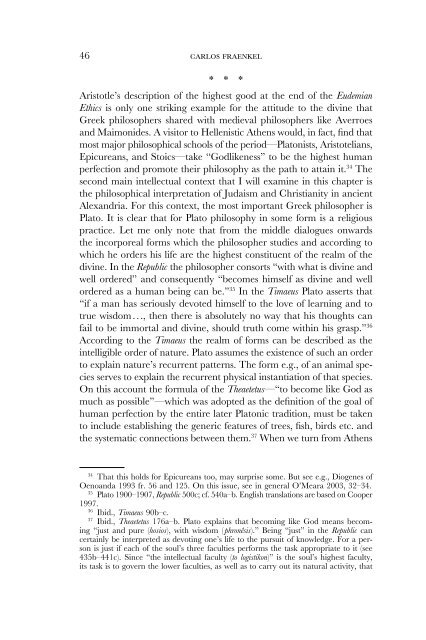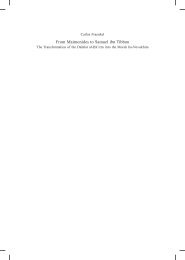Download PDF - Carlos F. Fraenkel
Download PDF - Carlos F. Fraenkel
Download PDF - Carlos F. Fraenkel
Create successful ePaper yourself
Turn your PDF publications into a flip-book with our unique Google optimized e-Paper software.
46 carlos fraenkel* * *Aristotle’s description of the highest good at the end of the EudemianEthics is only one striking example for the attitude to the divine thatGreek philosophers shared with medieval philosophers like Averroesand Maimonides. A visitor to Hellenistic Athens would, in fact, find thatmost major philosophical schools of the period—Platonists, Aristotelians,Epicureans, and Stoics—take “Godlikeness” to be the highest humanperfection and promote their philosophy as the path to attain it. 34 Thesecond main intellectual context that I will examine in this chapter isthe philosophical interpretation of Judaism and Christianity in ancientAlexandria. For this context, the most important Greek philosopher isPlato. It is clear that for Plato philosophy in some form is a religiouspractice. Let me only note that from the middle dialogues onwardsthe incorporeal forms which the philosopher studies and according towhich he orders his life are the highest constituent of the realm of thedivine. In the Republic the philosopher consorts “with what is divine andwell ordered” and consequently “becomes himself as divine and wellordered as a human being can be.” 35 In the Timaeus Plato asserts that“if a man has seriously devoted himself to the love of learning and totrue wisdom . . ., then there is absolutely no way that his thoughts canfail to be immortal and divine, should truth come within his grasp.” 36According to the Timaeus the realm of forms can be described as theintelligible order of nature. Plato assumes the existence of such an orderto explain nature’s recurrent patterns. The form e.g., of an animal speciesserves to explain the recurrent physical instantiation of that species.On this account the formula of the Theaetetus—“to become like God asmuch as possible”—which was adopted as the definition of the goal ofhuman perfection by the entire later Platonic tradition, must be takento include establishing the generic features of trees, fish, birds etc. andthe systematic connections between them. 37 When we turn from Athens34That this holds for Epicureans too, may surprise some. But see e.g., Diogenes ofOenoanda 1993 fr. 56 and 125. On this issue, see in general O’Meara 2003, 32–34.35Plato 1900–1907, Republic 500c; cf. 540a–b. English translations are based on Cooper1997.36Ibid., Timaeus 90b–c.37Ibid., Theaetetus 176a–b. Plato explains that becoming like God means becoming“just and pure (hosios), with wisdom ( phronêsis).” Being “just” in the Republic cancertainly be interpreted as devoting one’s life to the pursuit of knowledge. For a personis just if each of the soul’s three faculties performs the task appropriate to it (see435b–441c). Since “the intellectual faculty (to logistikon)” is the soul’s highest faculty,its task is to govern the lower faculties, as well as to carry out its natural activity, that



